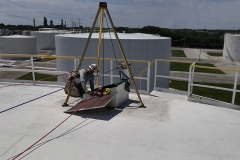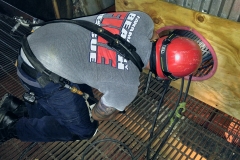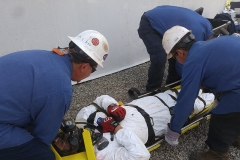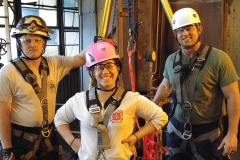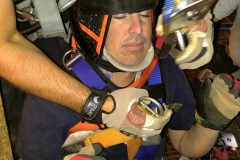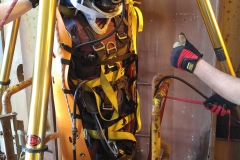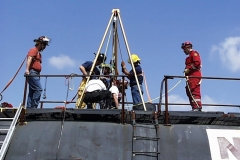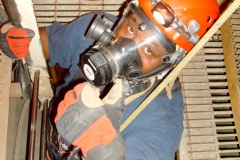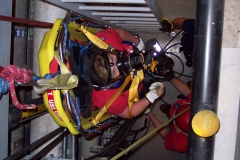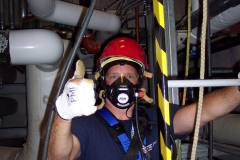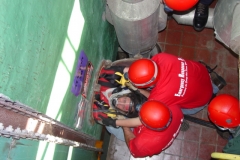Rope and Confined Space Rescue Training
Although distinctly separate, these two types of training courses often go hand-in-hand to allow Confined Space rescue team members to perform difficult extractions of patients from spaces within their facilities. Rope training is prerequisite to most Confined Space rescue for this reason.
Since methods, techniques, and technology change rapidly, we recommend refresher training for almost every course we teach. We recommend you repeat training courses at or above your present level at least every two years.
Rope and Confined Space Rescue, Industrial Operations Level – 45 hours, No Prerequisite.
This course is designed by to comply with the National Fire Protection Association’s (NFPA) 1670 standard on Operations and Training for Technical Search and Rescue incidents in an industrially focused five-day Open Enrollment format. It is intended for new and experienced rescue team personnel alike and covers techniques required by NFPA 1670’s chapter on confined space and rope rescue training at the Operations level. The program also meets most of the confined space and rope rescue technician requirements of NFPA’s 1006 standard on Technical Rescue Personnel Professional Qualifications and covers all OSHA requirements for safe entry and rescue operations from common permit-required confined space configurations. Some of the confined space and rope rescue techniques addressed within this course include:
- Rescue from spaces with a portal size large enough to accommodate a rescuer’s passage (including personal protective equipment) with room to spare, where the patient is visible and the interior configuration will accommodate multiple rescuers,
- Low and high-angle lowering techniques,
- Low and high-angle ascending techniques (both personal ascent and hauling systems),
- Patient care and litter packaging, and
- Safety systems analysis for all aspects of confined space rescue.
Rope Rescue, Florida Urban Search and Rescue (FLUSAR) Operations Level – 40 Hours, No Prerequisite.
Taught in conjunction with the FLUSAR Confined Space Operations-level Course, This class is designed by with the same NFPA objectives as the industrial course but with emphasis on State USAR team operations commonly associated with the fire service and disaster response. This course is taught in a five-day Open Enrollment format and is accredited through the State of Florida Bureau of Fire Standards and Training for FLUSAR personnel.
Confined Space Rescue, Florida Urban Search and Rescue (FLUSAR) Operations Level – 24 Hours, Prerequisite: FLUSAR Rope Rescue Operations Level.
Taught in conjunction with the FLUSAR Rope Rescue Operations-level Course, This class is designed by with the same NFPA objectives as the industrial course but with emphasis on State USAR team operations commonly associated with the fire service and disaster response. This course is taught in a three-day Open Enrollment format and is accredited through the State of Florida Bureau of Fire Standards and Training for FLUSAR personnel.
Rope and Confined Space Rescue, Industrial Technician Level – 45 Hours, Prerequisite: Rope and Confined Space Rescue, Industrial or USAR Operations Level.
This course is designed to comply with the National Fire Protection Association’s (NFPA) 1670 standard on Operations and Training for Technical Search and Rescue Incidents and is available in a 45-hour Open Enrollment format. It is intended for experienced rescue team members who are already very proficient in operations-level confined space and rope rescue skills. This program completes the confined space rescue technician requirements of NFPA’s 1006 standard on Technical Rescue Personnel Professional Qualifications and provides an in-depth study of OSHA regulations and rescue from more complex permit-space configurations, such as:
- Those whose portal size can barely accommodate the rescuer’s passage,
- Where the patient is not directly visible from the outside of the space, and
- Where the internal configuration will not allow entry of multiple rescuers.
Team members will also cover many important aspects of preparing for the incident; including preplanning, standard operating guideline development, and procedures for efficient response and deployment. These practices are combined with several advanced rope rescue techniques to provide your personnel with the skills they will need for technician-level situations.
Rope Rescue, Florida Urban Search and Rescue (FLUSAR) Technician Level – 40 Hours, Prerequisite: FLUSAR Rope Rescue Operations Level.
Taught in conjunction with the FLUSAR Confined Space Rescue Technician-level course, this class is designed by with the same NFPA objectives as the industrial technician course but with emphasis on State USAR team operations commonly associated with the fire service and disaster response. This course is taught in a five-day Open Enrollment format and is accredited by the State of Florida Bureau of Fire Standards and Training for FLUSAR personnel.
Confined Space Rescue, Florida Urban Search and Rescue (FLUSAR) Technician Level – 16 Hours, Prerequisite: FLUSAR Rope and Confined Space Rescue Operations Level.
Taught in conjunction with the FLUSAR Rope Rescue Technician-level course, this class is designed by with the same NFPA objectives as the industrial technician course but with emphasis on State USAR team operations commonly associated with the fire service and disaster response. This course is taught in a two-day Open Enrollment format and is accredited by the State of Florida Bureau of Fire Standards and Training for FLUSAR personnel.
Rope and Confined Space Rescue, Advanced – 45 Hours, Prerequisite: Rope and Confined Space Rescue, Technician Level.
This training program provides advanced situations and scenarios for the NFPA 1670-compliant technician-level confined space rescue team. The class teaches advanced concepts in teamwork and leadership, allowing a group of skilled individuals to become a more efficient, cohesive unit. This course is intended to address “real life” logistics and situations in the urban/industrial environment. It is best taught in the industrial environment under your standard response conditions. This course is taught in a five-day Open Enrollment format.

